Hi Everyone,
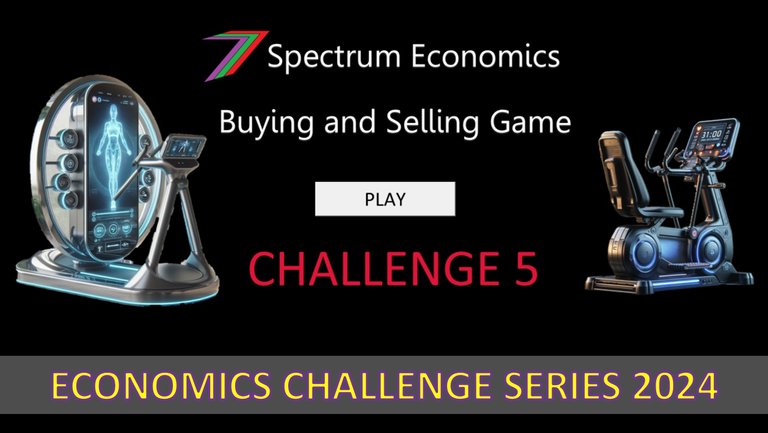
Welcome to the Economics Challenge Series for 2024. For July and August, I am running an economics challenge series. The series consists of seven challenges. All the challenges will commence in July and early August. I will publish and announce the results in August.
Six of the seven challenges from last year's Challenge Series return. The Tax Game from 2022 is replacing the business version of the Buying and Selling Game. Below is the list of challenges.
- Challenge 1: Ice Cream Game
- Challenge 2: Game Theory Game
- Challenge 3: Pick-a-Door
- Challenge 4: Complement vs. Substitute
- Challenge 5: The Buying and Selling Game
- Challenge 6: Even-to-Win
- Challenge 7: Tax Game
Each challenge could reward winners with as much as 60 Hive Power. The value of the prize will depend on the level of participation. For each new participant, the prize will increase by 5 Hive Power. This will continue until 60 Hive Power is reached (12 participants). The first 12 participants will also receive a 50% upvote from this account.
In addition to the prize money, the top few participants will be given points. These points will be used to determine the overall challenge series winner. This winner may receive as much as 80 Hive Power. The value of the prize will equal the sum of the number of participants across all challenges. This will continue until 80 Hive Power is reached.
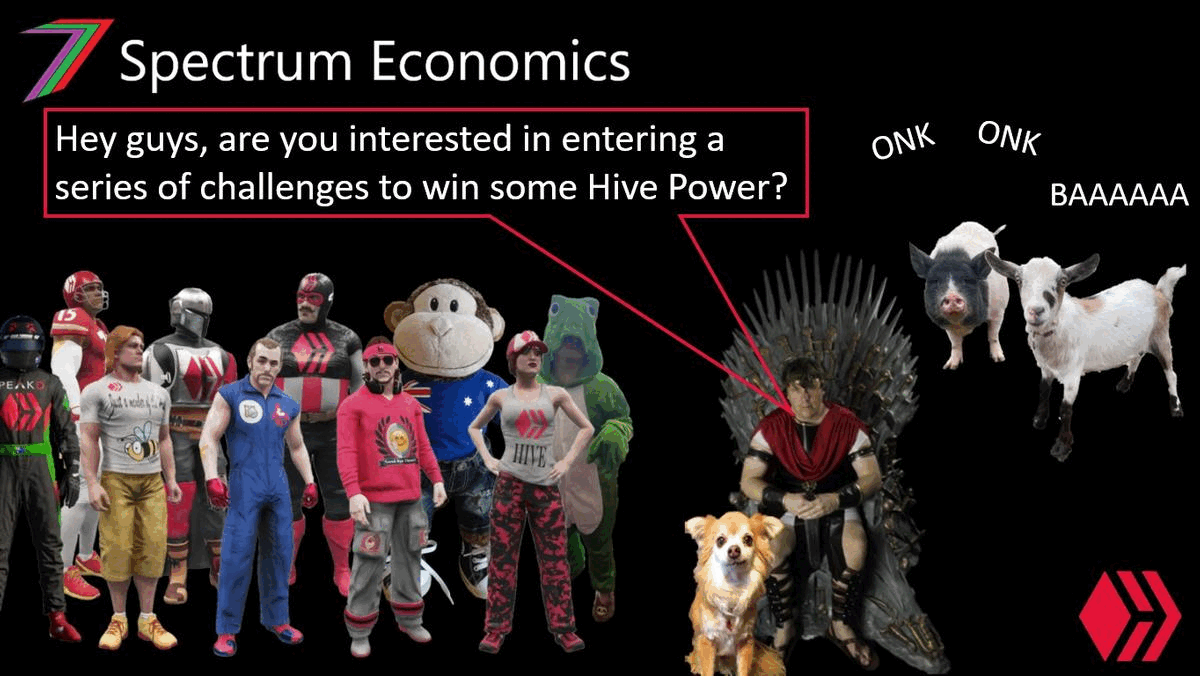
For more information on the challenge series and the upcoming challenges, I recommend that you read my post from last year. This year’s Challenge Series is run the same way as last year’s.
Welcome to Challenge 5 the Buying and Selling Game.
Until last year, the Buying and Selling Game (Original Version) and the business version of the game were alternated on a monthly basis. To become more familiar with this contest/challenge as well as how the results are generated, I recommend taking a look at the links below. Last on the list is the original Buying and Selling Game from the 2018 Challenge Series. This is the only challenge to appear in all five challenge series.
- Buying and Selling Game Contest #33 (Final Contest) – 30 Hive to be won
- Buying and Selling Game Contest 33 Results
- Challenge 1: Buying and Selling Game
- Economics Challenge Series – Challenge 1: Buying and Selling Game Results
- Economics 7 Week Challenge Series – Challenge 6: Buying and Selling Game
- Economics 7 Week Challenge Series – Challenge 6: Buying and Selling Game Results
- Spectrumecons 7 Week Challenge – Challenge 1: Buying and Selling Game
- Spectrumecons 7 Week Challenge – Challenge 1: Buying and Selling Game Results
- Spectrum Economics Challenge 3 – 25 SBD to be given away (Original Challenge from 2018
The Buying and Selling Game is also explained in the following original video:
How to Play?
The ‘Buying and Selling’ Game involves three simple steps.
- Choose one or more of six goods to buy.
- Choose the city, town, or planet where you will be buying these goods.
- Choose the city, town, or planet where you will be selling these goods.
All the information you need to know to play the game is provided in the question; i.e., no external research is required as all prices are hypothetical and locations are fictitious.
All entries must be made in the comments section of this post.
Each account is only permitted one entry.
Objectives of the Game
The objective of the game is to make the highest profit from the sale of all the goods you have bought. If two participants make the exact same profit, the participant who entered first wins.
Game Assumptions
All goods of the same type are identical; for example, Good A bought in Town X is the same as Good A bought in Town Y.
There are zero transaction and transport costs.
All cities, towns, and planets use the same currency.
What Information is Provided?
- All the cities, towns, and planets are provided.
- All the goods that can be bought in the game are provided.
- All the buying prices of the goods are provided.
- None of the selling prices of the goods are provided. Instead, a possible range of prices is provided. This range is represented by maximum, minimum, and mode prices (i.e., the most frequently occurring price). See the diagram below.
Selling Price Distribution
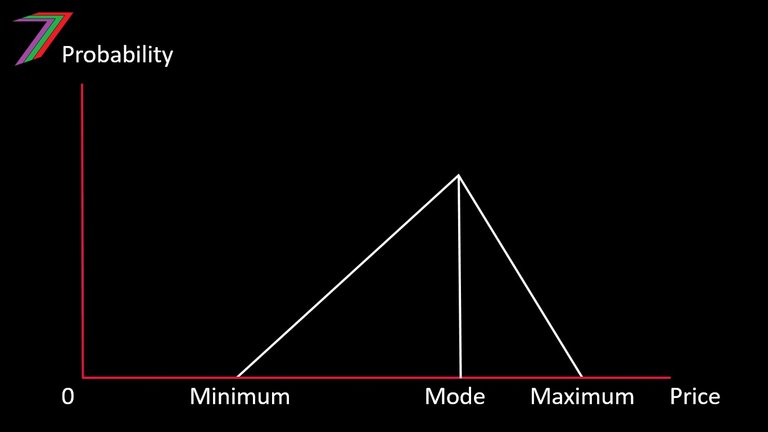
Note: Triangular Distribution
How Are the Results of the Game Determined?
A Microsoft Excel model is used to determine the selling prices of each good in each city, town, or planet. These prices will be used to calculate the profits made by each participant. In the results post, the calculation of the selling price will be presented in a video. To learn more about how the results are calculated and presented, click on one of the results post links provided earlier in the post.
Challenge Prizes
The total prize for this challenge could reach as high as 60 Hive Power. The number of participants determines the value of the prize. For every entry, the prize is increased by 5 Hive Power until a value of 60 Hive Power is reached. The winner will receive 2/3 of the prize and second place will receive 1/3. The first 12 entries will be given upvotes.
The most profitable buying and selling price combination is also calculated. If the winner adopts this strategy and the value of the prize is below 60 Hive Power, he or she will receive an additional 5 Hive Power. The winner of this challenge will be given 30 points, second place 15 points, and third place 5 points. These points will be tallied at the end of the challenge series to determine the overall winner.
Let the Challenge Begin!
The Buying and Selling Game returns to outer space. Participants have been allocated a budget of $500,000 to buy 1 or more pieces of exercise equipment from one of the following 5 planets.
- Fierce
- Eco
- Oink Onk
- Proud
- Sweet
See map below:
Map of Planets
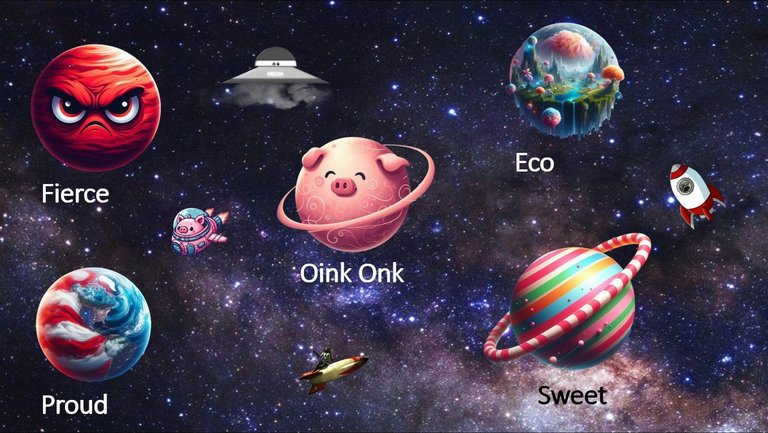
All of the following exercise equipment is available on all 5 planets:
- Treadmill
- Spin Bike
- Rowing Machine
- Stair Climber
- Cross Trainer
- All-in-One Fitness Machine
Table 1 contains the prices of each type of exercise equipment for each planet.
Table 1: Prices of Exercise Equipment for Each Planet
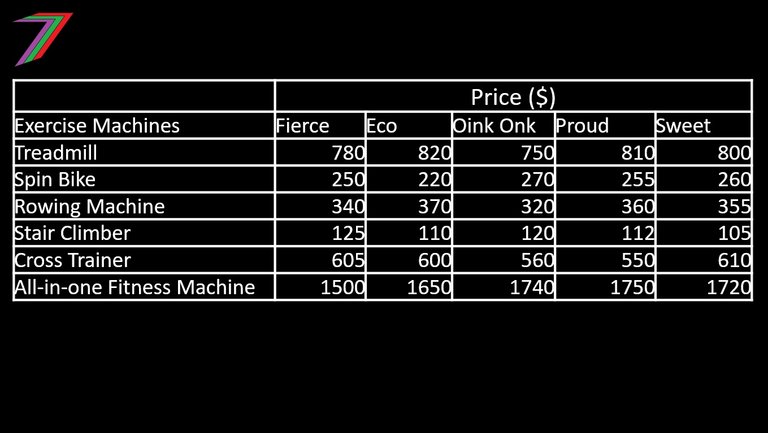
Note: Exercise equipment can only be bought as whole pieces. For example, a participant could only buy 909 cross trainers from Proud, as there is insufficient money to buy the 910th cross trainer.
After buying the exercise equipment, the participant must then sell all the exercise equipment he or she has bought on just one of the planets named in the question. Remember, the selling prices are revealed in the results post. These prices are determined using the information provided in Tables 2, 3, and 4.
Table 2: Minimum, Maximum, and Mode (Fierce & Eco)
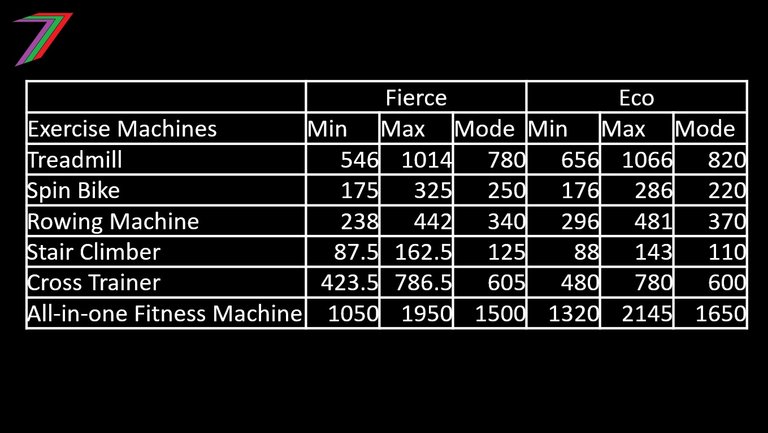
Table 3: Minimum, Maximum, and Mode (Oink Onk & Proud)
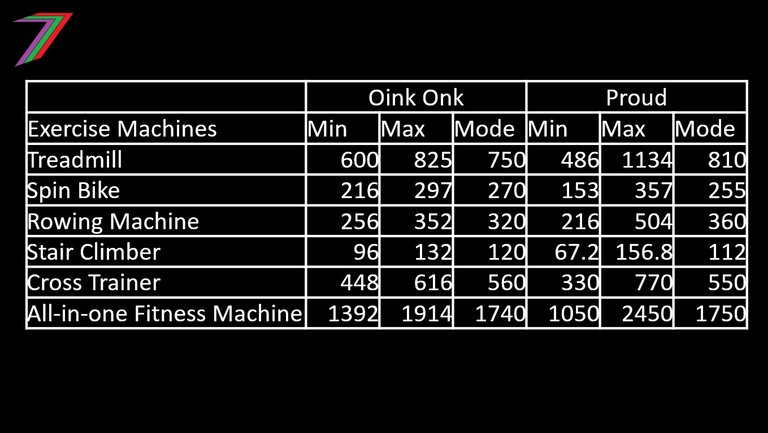
Table 4: Minimum, Maximum, and Mode (Sweet)
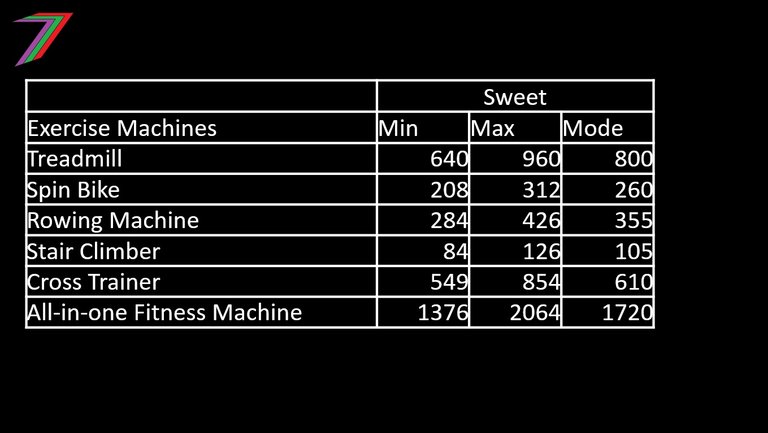
Entry Format
For this challenge, I expect to see entries made in the following format:
Buying
Name of Planet:
Goods purchased:
Number purchased:
Amount spent on goods:
Selling
Name of Planet:
Example of Entry
Buying
Name of Planet: Oink Onk
Goods purchased: Teadmills
Number purchased: 666
Amount spent on goods: $499,500
Selling
Name of Planet: Proud
The closing date and time for this challenge is 6PM coordinated universal time (UTC) 31/07/2024. Responses after this time will not be accepted. Next month, the answers will be provided in the results post along with the video containing the generation of selling prices using the model.
I hope everyone has fun and enjoys this challenge. I look forward to your participation in the remaining challenges. If you have any questions, feel free to ask in the comments section.
My New Book, Sapien Loop

I have published an ebook on Amazon; it is titled ‘Sapien Loop: End of an Era’. The book is fiction. I do not normally write fiction. However, I felt it was appropriate considering what is happening in the world today. Freedom is the most important thing we have, but we are gradually losing it. I have covered this in many of my posts.
In the story, most citizens do not understand the concept of freedom because they have never really experienced it. In essence, the story is about an alien world that might represent our not-so-distant future. There are many other elements to the story that are an abstract and exaggerated version of our reality. I believe this book to be an important read, and I believe it has the potential to change the way you think.
Brief Summary of Sapien Lopp
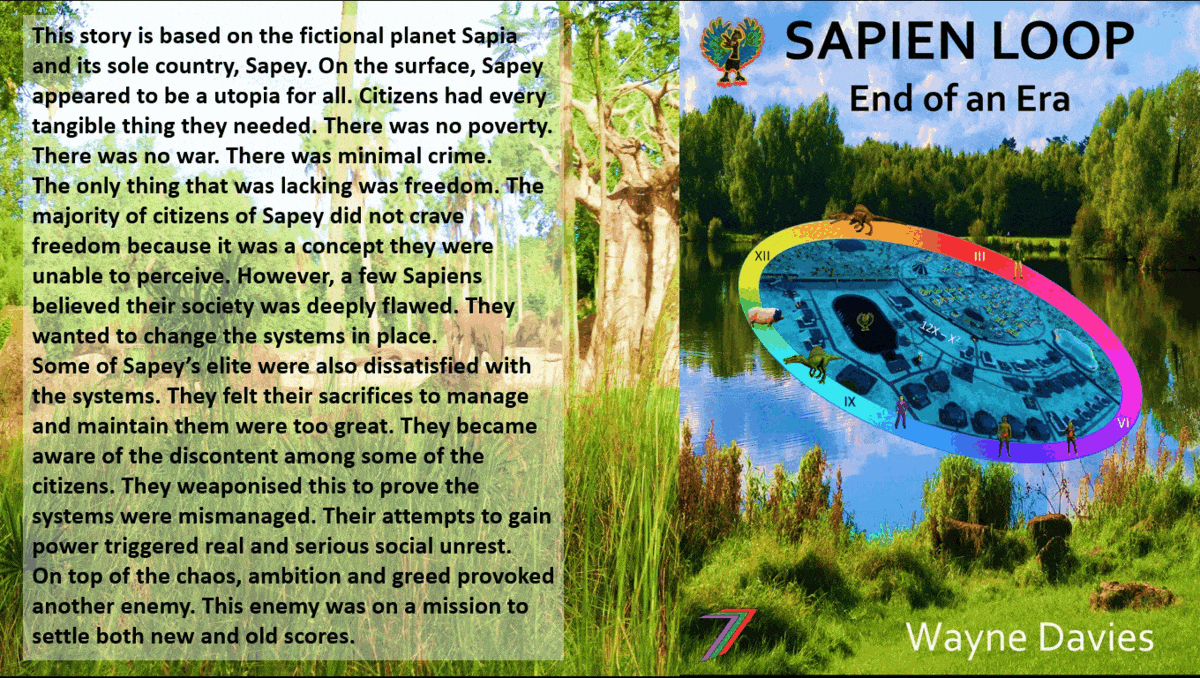
This story is based on the fictional planet Sapia and its sole country, Sapey. Sapey is portrayed as a form of utopia for all its citizens. No poverty. No war. Almost no crime. Opportunities for all.
This was enough for most citizens, but not all. In one of the small regions, some of the citizens had become discontent. They felt something important was missing in their lives. Their discontent did not go unnoticed. Some of the Sapey elite wanted to weaponise this discontent to gain more power. This created more chaos than they anticipated. This led to further widespread social unrest.
On top of the chaos, ambition and greed provoked another enemy. This enemy was on a mission to settle both new and old scores.
If you want to buy a copy of the book, below are links to the relevant Amazon websites for each country it is available in. The book is priced at approximately US$5.08.
- Amazon USA
- Amazon UK
- Amazon Germany
- Amazon France
- Amazon Spain
- Amazon Italy
- Amazon Netherlands
- Amazon Japan
- Amazon Brazil
- Amazon Canada
- Amazon Mexico
- Amazon Australia
- Amazon India
I am also running monthly contests where participants are required to answer questions based on the book. The prize is 30 Hive Power plus upvotes for the first twelve entries. You can recover the cost of the book with just one win.
Hive: Future of Social Media

Spectrumecons on the Hive Blockchain

